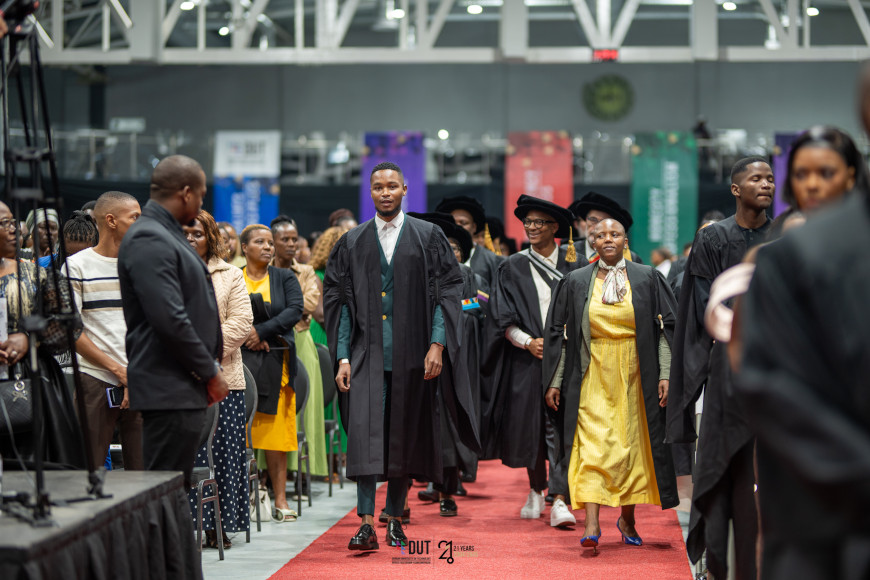Four PhD graduates from the Durban University of Technology (DUT) Faculty of Health Sciences were honoured at the Autumn 2025 Graduation ceremony, held at the Olive Convention Centre on 20 My. The graduates, Dr Adelle Kemlall Bhundoo, Dr Marilynne Coopasami,, Dr Aadil Docrat, received their Degrees of Doctor of Philosophy in Health Sciences. Also, excitedly receiving his Degree of Doctor of Radiography was Dr Peter Clark Du Plessis.
Dr Bhundoo spoke on his dissertation called: Physical activity and health during the SARS-COV-2 pandemic: The effectiveness of an online physical activity intervention.
She said: “Regular physical activity (PA) is known to prevent non-communicable diseases, improve physical and mental health, as well as promote overall well-being. Online PA has recently gained popularity, particularly when access to conventional exercise is limited. This global study evaluated the effectiveness of online PA interventions, focusing on physical and mental health outcomes.”
Dr Coopasami shared more on his academic thesis which looked at a critical self-reflection on the relationship of teaching practice to the enhancement of at-risk student academic performance.
“The significance of this study lies in my role as a lecturer in higher education, where I conducted this study out of deep concern for my students who were ‘at-risk’ of failing Anatomy and Physiology and the need to create Whole-Being Learners. This study aimed to conduct a critical self-reflection on the impact of my teaching and assessment practices on the academic performance and security of nursing students registered for Anatomy and Physiology in the Department of Nursing in the Faculty of Health Sciences at the Duban University of Technology, with specific reference to the subject being ‘at-risk’,” she highlighted.
Adding to the academic conversation on research, Dr Aadil Docrat professed that his research focused on the effect of wet and dry cupping therapies on selected haematological and immune system parameters in healthy males in South Africa.
Dr Docrat emphasised that cupping therapy is a traditional healing modality used for centuries in many cultures to relieve pain, improve immunity, and promote good health.
“Despite its popularity, modern medicine has yet to fully explain its mechanism of action. There is limited research on how cupping affects the immune and haematological systems, or whether different types of cupping; wet cupping (which involves light bleeding) and dry cupping (which does not); have different effects,” he added.
He further indicated that these findings provide early scientific support for wet cupping’s effects on the immune system and highlighted the need for further research into its potential long-term benefits.
The sterling, academic research were all brought to the forefront and with medical health in mind, the final PhD graduate, Dr Du Plessis shared his excellent research pertaining to in-vitro evidence towards receptiveness of hypofractioned radiotherapy for breast and prostate cancer.
His study looked at the significant challenges of breast and prostate cancers, which had been made worse by the COVID-19 pandemic. It explored the impacts of two types of radiation therapy: hypofractionated radiotherapy (HFR T) and conventionally fractionated radiotherapy (CFR T).
“The focus was on how these treatments affected both cancerous and non-cancerous cells in terms of survival, growth, and how they spread. The research found that different types of cancer cells reacted differently to the treatments,” he explained.
Overall, the findings in the thesis highlighted the need for personalised radiation therapy that considered the specific characteristics of each patient’s breast or prostate cancer.
The session also saw seven remarkable Degrees of Master of Health Sciences being
Pictured: DUT’s Nkululeko Mbatha and Bongiwe Chiliza mark the opening of the Faculty of Health Sciences academic procession.
Waheeda Peters

